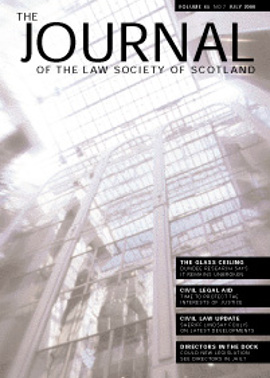Resuscitating civil legal aid
For some years now there have been murmurings in the profession that civil legal aid is in crisis. A steady trickle of firms have dropped out of the scheme and eligibility has been steadily eroded both by a failure to link it to average wage rather than benefit levels and the cuts imposed by the last Government. It is no longer available to those of modest means but only to the very poor, leaving an unacceptable proportion of the population unable to pursue their legal entitlement. The result of this is not just individual hardship, but successive administrations have been unable or unwilling to see the bigger picture. Just about every penny spent on civil legal aid has an effect on the social costs of a breach of someone’s civil rights.
Reparation cases, which are largely self-funded in any event, frequently result in a recoupment of benefits paid and reduce future dependency on benefits by properly compensating the injured party. Securing an exclusion order or transfer of the family home means less of a drain on scarce local authority housing provision and a fair financial settlement on divorce means, again, less dependency on benefits. These are just two examples of what is, in fact, a much greater and more complex interdependency between civil rights and public expenditure but despite the fact that we now have a Scottish Parliament there is no sign that this simple economic fact is in any sense informing its decisions.
Indeed there is no sign of any decisions at all. The consultation paper on civil legal aid issued by the previous administration has sunk without trace and while this may be no bad thing given that it was based on a number of false assumptions and treasury-driven, it is simply unacceptable that no alternative has been put forward.
The only idea which has drifted out of the Scottish Executive is the Community Legal Service. This is a vague concept, largely developed in England in response to burgeoning civil legal aid expenditure. It was developed, largely to save money but dressed up as socially useful. In Scotland civil legal aid expenditure is on a steady downward curve and is being delivered efficiently and economically. Surely it is not too much to expect that a Scottish Parliament will recognise the uniqueness of our system of law and legal aid and not cling to the coat tails of England.
In the hope that a Scottish solution to a Scottish problem is being pursued by the Justice and Home Affairs Committee, I put forward the following suggestions.
Understand that civil legal aid provides not just individual remedies but makes a contribution to the well being and proper functioning of society as a whole. It has cost benefits across a wide range of other social expenditure and most importantly should ensure that all of us who are accorded rights are in a position to assert them. This is an essential element of a civilised society.
Take a long hard look at the multiplicity of regulations which impede the efficient delivery of civil legal aid. Is it really necessary to have so many controls? Is there a proper balance between prudent budget control and effective delivery of a necessary service. Think about visiting your GP and being told that you might have a serious infection but before any proper investigation, let alone treatment, can be carried out you will need to fill in this form then come back in a fortnight if you survive, oh, and by the way pay £500 meantime.
The Scottish Legal Aid Board was set up to administer legal aid. Why don’t you give them a bit more freedom to do that instead of fettering them through Act, Regulations and Financial Memoranda.
Increase eligibility so that the scheme again provides for those of modest means, not just the very poor. This might cost money in the short term but it may well save it in the long term and after all we seem to have been able to afford a much wider scheme only a few years ago.
Finally, take urgent steps to review the present level of fees. Legal Aid was never intended to be a charitable endeavour on the part of solicitors. In fact it was introduced like the NHS so that those of limited means would not be dependent on the charity of individual solicitors. Access to legal remedies is a right, not a privilege for the few in a civilised society. Payment to solicitors which was once not far short of private rates is currently running at about half or less than half of private rates. This cannot continue. There is no more room in these market driven days for cross subsidisation. Every element of a solicitor’s business must generate sufficient of a return to pay overheads and leave a surplus and that includes civil legal aid. No one expects to make much money out of civil legal aid but we cannot continue to provide it at a loss. Solicitors have nothing to lose if civil legal aid disappears overnight. The public has.
Michael Scanlan is immediate Past President of the Society and Convener of the Civil Legal Aid Working Party.
The views in this article are written in a personal capacity and may not reflect the views of The Society or the Legal Aid Committee
In this issue
- President's report
- Still a glass ceiling for women solicitors?
- Resuscitating civil legal aid
- Companies and directors in the dock
- The Scottish Parliament one year on
- The law of design
- Discretion in granting decree by default
- Representing clients in mediation
- Risk assessments (health and safety regulations)
- The headache of domain names
- Reminder of routine risk issues






